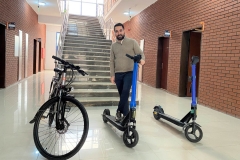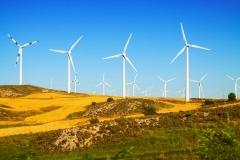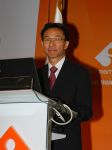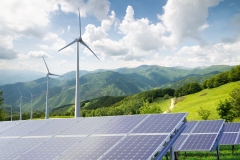
GRADUATE SCHOOL
Sustainable Energy (With Thesis)
SEN 553 | Course Introduction and Application Information
| Course Name |
Energy and Society
|
|
Code
|
Semester
|
Theory
(hour/week) |
Application/Lab
(hour/week) |
Local Credits
|
ECTS
|
|
SEN 553
|
Fall/Spring
|
3
|
0
|
3
|
7.5
|
| Prerequisites |
None
|
|||||
| Course Language |
English
|
|||||
| Course Type |
Elective
|
|||||
| Course Level |
Second Cycle
|
|||||
| Mode of Delivery | - | |||||
| Teaching Methods and Techniques of the Course | - | |||||
| Course Coordinator | ||||||
| Course Lecturer(s) | - | |||||
| Assistant(s) | - | |||||
| Course Objectives | The purpose of this course is to enable students to analyze and understand the relationships among society, environment and energy. |
| Learning Outcomes |
The students who succeeded in this course;
|
| Course Description | Energy is a key social variable in accounting for outcomes such as interstate conflicts, civil wars and poverty. Recent global discussions on issues such as climate change, water scarcity and energy poverty have increased the scholarly interest in the dynamics and nature of social aspects of energy systems. This course will address questions like: In what ways does the availability of energy affect public opinion and societal activities? What are the social structural and social psychological bases of energy concerns? How are energy problems different in developing nations? Why is there no societal consensus on global warming? What are the social consequences of natural resource dependency? How do different social groups view energy crises? And what are the explanations of gender inequities in energy consumption? This course will take a sociological approach to answer these questions but it will also emphasize the need for an interdisciplinary perspective to gain an adequate understanding of technical, economic, social, regional, political and environmental dynamics of energy systems and options. |
|
|
Core Courses |
X
|
| Major Area Courses | ||
| Supportive Courses | ||
| Media and Management Skills Courses | ||
| Transferable Skill Courses |
WEEKLY SUBJECTS AND RELATED PREPARATION STUDIES
| Week | Subjects | Related Preparation |
| 1 | Introduction | No Assigned Readings |
| 2 | Explaining Public Opinion and Behavior | 1) Jon Elster, Nuts and Bolts for the Social Sciences, Cambridge University Press. Chapters 1/4, 2) Zaller, John. 1992. The Nature and Origins of Mass Opinion. New York: Cambridge University Press. pp. 6 /28. |
| 3 | Can Public Opinion Make an Impact on Policymakers? | 1) Jacobs, Lawrence R., and Robert Y. Shapiro. 2000. Politicians Don’t Pander: Political Manipulation and the Loss of Democratic Responsiveness. Chicago: University of Chicago Press. Chapter 8. 2) Schlozman, Kay Lehman. 2003. “Vox Populi: Public Opinion and the Democratic Dilemma.” Brookings Review 21 (3): 4/7. |
| 4 | How Can We Measure Public Opinion and Attitudes | Zaller, John. 1992. The Nature and Origins of Mass Opinion. New York: Cambridge University Press. pp. 28/39. |
| 5 | Why do we need to study what people think of energy use? | 1) Eugene A. Rosa, Gary E. Machlis, Kenneth M. Keating (1988) “Energy and Society,” Annual Review of Sociology, 14: 149/172. 2) Yergin, D. (1991) The Prize: The Epic Quest for Oil, Money, and Power. New York: Simon & Schuster. Pages 1116. 3) Burstein, Paul (2003) “The Impact of Public Opinion on Public Policy: A Review and an Agenda” Political Research Quarterly, 56(1): 29/40. |
| 6 | Social Movements, Collective Action and their Impact on Energy Policies | 1) Joppke, Christian (1991) “Social Movements during Cycles of Issue Attention: The Decline of the AntiNuclear Energy Movements in West Germany and the USA,” The British Journal of Sociology, 42(1): 43/60. 2) Tarrow, Sidney G. 1994. Power in Movement: Social Movements, Collective Action, and Politics. Cambridge: Cambridge University Press. |
| 7 | Midterm Exam | |
| 8 | Tragedy of the Commons and its Impact on Energy Policies | 1) Hardin, Garrett (1968), The Tragedy of the Commons, Science, 162: 1243/1248. 2) Kollock, Peter (1998) “Social Dilemmas: The Anatomy of Cooperation,” Annual Review of Sociology, 24: 183/214. 3) Shepsle, Kenneth A. and Mark S. Bonchek. 1997. Analyzing Politics: Rationality, Behavior, and Institutions. New York: W.W. Norton: 197/219. |
| 9 | Campaigns, Elections, Voting and Energy Policies | Stimson, James. 2004. Tides of Consent: How Public Opinion Shapes American Politics. New York: Cambridge University Press. Chapter 4. |
| 10 | Energy and the Media | 1) Erfle Stephen, McMillan, Henry, Grofman, Bernard (1991) “Regulation Via Threats: Politics, Media Coverage, and Oil Pricing Decisions,” The Public Opinion Quarterly, 54(1): 48/63. 2) Sears, David O., and Richard Kosterman. 1994. “Political Persuasion.” In Sharon Shavitt & Timothy C. Brock (eds.), Persuasion: Psychological Insights and Perspectives. Boston: Allyn & Bacon. pp. 251/278. |
| 11 | Gender and Energy | 1) Adams, Carol J., ed. Ecofeminism and the Sacred. New York: Continuum, 1993. 2) Bose, S. (1993) “Women, Work, and Household Electrification in Rural India”, in Money, Energy and Welfare (Oxford University Press: Bombay, India), Chapter V, pages 143 – 181. 3) Warren, Karen J., ed. Ecological Feminism. New York: Routledge, 1994. |
| 12 | Society, Sustainable Development and Environmental Justice | 1) O’Rourke, D. and Connolly, S. (2003) “Just oil? The distribution of environmental and social impacts of oil production and consumption,” Annual Reviews of Environment and Resources, 28, 587/617. 2) Pastor, Manuel, (2007) “Environmental Justice: Reflections from the United States”, Ch. 14 in Reclaiming Nature. pp. 351–376. 3) Revkin, Andrew C. (2007) “Poorest Nations will Bear Brunt as World Warms,” New York Times, April 1. 4) Adams., W.M. 1991. Green Development: Environment and Sustainability in the Third World. Routledge Press. |
| 13 | Society, Economic Development and Energy | 1) Goldemberg, J. (1996) Energy, Environment, and Development (Earthscan: London, UK), 11 – 37. 2) Baker, Jonathan (1977) “Oil and African Development,” The Journal of Modern African Studies, 15(2): 175 212. |
| 14 | Public Opinion on Climate Change | 1) Kolbert, E. (2005). “The Climate of Man–I.” The New Yorker, April 25. 2) Kolbert, E. (2005). “The Climate of Man–II.” The New Yorker, May 2. 3) Kolbert, E. (2005). “The Climate of Man–III.” The New Yorker, May 9. 4) Baer, P., et al. (2000). “Equity and Greenhouse Gas Responsibility.” Science 289(5488): 22/87. 5) Jorgenson, Andrew K. (2006) “Global Warming and the Neglected Greenhouse Gas: A CrossNational Study of the Social Causes of Methane Emissions Intensity, 1995,” Social Forces, 84(3): 1779/1798. |
| 15 | Final Exam | |
| 16 | Review of the Semester |
| Course Notes/Textbooks | Parts from book that mentioned above and PowerPoint presentations |
| Suggested Readings/Materials | Mersereau & Jackson, “Circuit Analysis: A Systems Approach”, Prentice Hall, Upper Saddle River, New Jersey, ISBN 0130932248. |
EVALUATION SYSTEM
| Semester Activities | Number | Weigthing |
| Participation |
12
|
10
|
| Laboratory / Application | ||
| Field Work | ||
| Quizzes / Studio Critiques | ||
| Portfolio | ||
| Homework / Assignments |
5
|
30
|
| Presentation / Jury | ||
| Project | ||
| Seminar / Workshop | ||
| Oral Exams | ||
| Midterm |
1
|
25
|
| Final Exam |
1
|
35
|
| Total |
| Weighting of Semester Activities on the Final Grade |
65
|
|
| Weighting of End-of-Semester Activities on the Final Grade |
35
|
|
| Total |
ECTS / WORKLOAD TABLE
| Semester Activities | Number | Duration (Hours) | Workload |
|---|---|---|---|
| Theoretical Course Hours (Including exam week: 16 x total hours) |
16
|
3
|
48
|
| Laboratory / Application Hours (Including exam week: '.16.' x total hours) |
16
|
0
|
|
| Study Hours Out of Class |
15
|
3
|
45
|
| Field Work |
0
|
||
| Quizzes / Studio Critiques |
0
|
||
| Portfolio |
0
|
||
| Homework / Assignments |
5
|
5
|
25
|
| Presentation / Jury |
0
|
||
| Project |
0
|
||
| Seminar / Workshop |
0
|
||
| Oral Exam |
0
|
||
| Midterms |
1
|
30
|
30
|
| Final Exam |
1
|
32
|
32
|
| Total |
180
|
COURSE LEARNING OUTCOMES AND PROGRAM QUALIFICATIONS RELATIONSHIP
|
#
|
Program Competencies/Outcomes |
* Contribution Level
|
||||
|
1
|
2
|
3
|
4
|
5
|
||
| 1 | To be able to comprehend the critical role and influences of energy resources, energy supply and energy demand for policy-makers, collectives and society. |
|||||
| 2 | To be able to evaluate the problems and circumstances about energy studies by using theoretical and practical knowledge in fundamental disciplines of energy studies such as geopolitics, market dynamics, technologies, risk management, environmental issues, legal issues, transportation, and strategies. |
X | ||||
| 3 | To be able to analyse multi-dimensional problems through working with others and to demonstrate leadership in addressing complex issues in the field of energy studies. |
|||||
| 4 | To be able to develop an understanding of the key energy policy issues relating to structures, markets, institutions, regulations, climate change and environment in a critical perspective. |
X | ||||
| 5 | To be able to acquire an informed opinion on contemporary methods, strategies and policies implemented in the international energy arena, and the ability to engage with policy-makers, business representatives, and regulators among others. |
X | ||||
| 6 | Be able to analyse, formulate, and handle energy related questions from a social science and humanities perspective, with an overview the theories, scenarios and concepts by using scientific research methods. |
|||||
| 7 | To critically evaluate data and systematically examine issues relating to the international energy arena, utilizing knowledge on recent developments in the scope of energy studies. |
|||||
| 8 | To be able to have ethical, social and scientific values in the stages throughout the processes of gathering, interpreting, disseminating and implementing data relevant to Energy. |
|||||
| 9 | To be able to prepare an original thesis/term project, utilizing appropriate methodologies of broad social sciences and humanities related disciplines applied to the questions and/or issues. |
X | ||||
| 10 | To be able to follow new research and developments, publish scientific articles and participate the debates in academic meetings in the field of Energy through a foreign language. |
|||||
*1 Lowest, 2 Low, 3 Average, 4 High, 5 Highest
NEWS |ALL NEWS

‘Double award’ for energy efficiency
Izmir University of Economics (IUE) received a double award at the ‘Innovative Idea Development Workshop in the Electricity Distribution Sector’ organized with

International investment for ‘Scootable’
Emrecan Durmaz, a student of Izmir University of Economics (IUE), who developed the software infrastructure that enables electric scooters and bicycles to

‘Social' analysis of energy’
Prof. Dr. Mehmet Efe Biresselioğlu from Izmir University of Economics (IUE) has implemented the ‘Cure’ project with 2 countries to measure the

THE ENERGY WORKSHOP AT IUE
Energy policies have been discussed at Izmir University of Economics (IUE). It has been reported at the “6th Energy Management and Policies

IUE STEERING EUROPE’S ENERGY
Izmir University of Economics will be steering energy policy of European Union. Department of Sustainable Energy of Izmir University of Economics will

ENERGY; FOCAL POINT OF TURKS AND CHINESE
Yu Hongyang, Ambassador of the People's Republic of China to Ankara, who was a keynote speaker at the 5th Energy Management and


